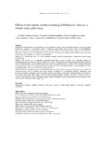Effects of movement imitation training in Parkinson's disease: a virtual reality pilot study

View/
Use this link to cite
http://hdl.handle.net/2183/16598
Except where otherwise noted, this item's license is described as Creative Commons Attribution-NonCommercial-NoDerivs 4.0 International Licence (CC-BY-NC-ND 4.0)
Collections
- Investigación (FCS) [1293]
Metadata
Show full item recordTitle
Effects of movement imitation training in Parkinson's disease: a virtual reality pilot studyAuthor(s)
Date
2016-05Citation
Robles-García V, Corral-Bergantiños Y, Espinosa N, García-Sancho C, Sanmartín G, Flores J, Cudeiro J, Arias P. Effects of movement imitation training in Parkinson's disease: A virtual reality pilot study. Parkinsonism Relat Disord. 2016 May;26:17-23.
Abstract
[Abstract] Background. Hypometria is a clinical motor sign in Parkinson's disease. Its origin likely emerges from basal ganglia dysfunction, leading to an impaired control of inhibitory intracortical motor circuits. Some neurorehabilitation approaches include movement imitation training; besides the effects of motor practice, there might be a benefit due to observation and imitation of un-altered movement patterns. In this sense, virtual reality facilitates the process by customizing motor-patterns to be observed and imitated.
Objective. To evaluate the effect of a motor-imitation therapy focused on hypometria in Parkinson's disease using virtual reality.
Methods. We carried out a randomized controlled pilot-study. Sixteen patients were randomly assigned in experimental and control groups. Groups underwent 4-weeks of training based on finger-tapping with the dominant hand, in which imitation was the differential factor (only the experimental group imitated). We evaluated self-paced movement features and cortico-spinal excitability (recruitment curves and silent periods in both hemispheres) before, immediately after, and two weeks after the training period.
Results. Movement amplitude increased significantly after the therapy in the experimental group for the trained and un-trained hands. Motor thresholds and silent periods evaluated with transcranial magnetic stimulation were differently modified by training in the two groups; although the changes in the input–output recruitment were similar.
Conclusions. This pilot study suggests that movement imitation therapy enhances the effect of motor practice in patients with Parkinson's disease; imitation-training might be helpful for reducing hypometria in these patients. These results must be clarified in future larger trials.
Keywords
Hypokinesia
Learning
Imitative behavior
Parkinson's disease
Virtual reality therapy
Transcranial magnetic stimulation
Learning
Imitative behavior
Parkinson's disease
Virtual reality therapy
Transcranial magnetic stimulation
Editor version
Rights
Creative Commons Attribution-NonCommercial-NoDerivs 4.0 International Licence (CC-BY-NC-ND 4.0)






